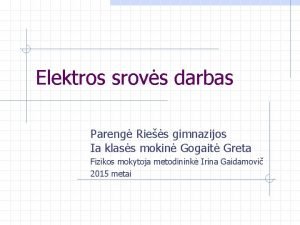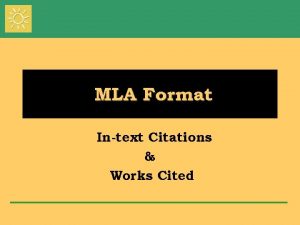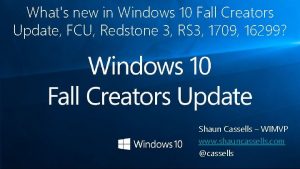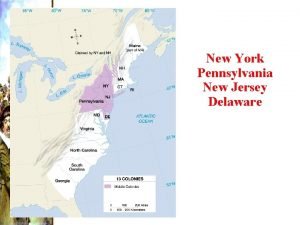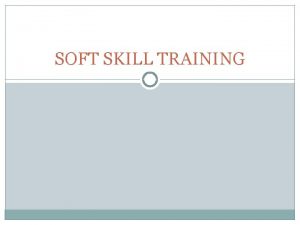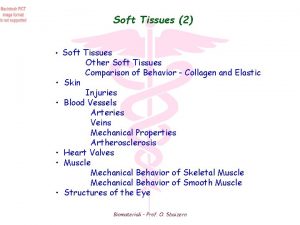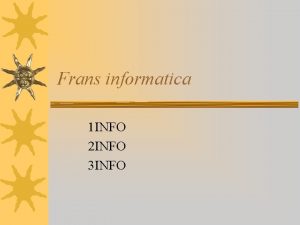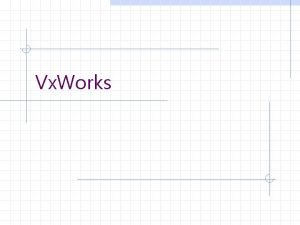MWH Soft Whats New in Info Works CS















- Slides: 15

MWH Soft What’s New in Info. Works CS v 10. 0 Andrew Walker

What’s New in CS v 10. 0 New Features • • Support for 64 -bit Microsoft Windows Operating Systems 3 D Terrain View Improvement Polygon Merging Tool SWMM 5 Importer New Features (2 D) • • • Collapsing Walls Porous Polygons Option to Restrict Application of Rainfall to Mesh Elements Outside of Subcatchments Mesh Polygon Ground Level Modification Minimum Virtual Element Area for Mesh Polygons

What’s New in CS v 10. 0 New Features (2 D) • • Element Results Displayed on Mesh Element Properties Dialog New 2 D Simulation Polygon Results Ability to Specify Element to be displayed in Mesh Element Properties Dialog Additional Results for 2 D Results Analysis Objects SQL Expression Themes for 2 D Triangles Change in Terminology for 2 D Simulation Polygon Field 2 D Outfall Validation Warning Added Improvements to Mesh 2 D Simulation Polygons Log • • Efficiency Improvements 2 D Engine Parallelisation

What’s New in CS v 10. 0 Support for 64 -bit Microsoft Windows Operating Systems Info. Works CS is now supported in the following x 64 64 -bit Microsoft Windows operating systems: Windows Vista, Windows XP, Windows Server 2003 and Windows Server 2008. Although they remain 32 -bit applications, under Windows Vista 64 -bit SP 1, Info. Works can have the full 4 GB address space available, rather than the normal 2 GB. This increase in available memory can result in significant improvements in process speed.

What’s New in CS v 10. 0 Support for 64 -bit Microsoft Windows Operating Systems Info. Works CS is now supported in the following x 64 64 -bit Microsoft Windows operating systems: Windows Vista, Windows XP, Windows Server 2003 and Windows Server 2008. Although they remain 32 -bit applications, under Windows Vista 64 -bit SP 1, Info. Works can have the full 4 GB address space available, rather than the normal 2 GB. This increase in available memory can result in significant improvements in process speed.

What’s New in CS v 10. 0 3 D Terrain View Improvement When viewing 3 D Terrain View containing a large number of objects, the option of whether or not to include network objects in the view is now given. This option allows a simple 3 D view to be created without the impact on performance caused by including a large amount of network data. Polygon Merging Tool The polygon merging functionality has been extended to apply to all polygon types. It is now possible to merge a selected pair of contiguous polygons, provided the selected polygons are of the same type. Note that the Merge Flood Compartments tool is no longer available from the Flood Mapping Toolbar. To merge flood compartments, use the new general polygon merging tool, which is accessed via the Geo | Geometry | Merge Polygons. . . menu option. SWMM 5 Importer It is now possible to import network data from SWMM 5. INP and. INI files.

What’s New in Info. Works CS/2 D v 10. 0

What’s New in CS/2 D v 10. 0 Porous Polygons A new polygon type allowing specification of porous boundaries has been added. The Porous Polygon object can be used to represent an enclosed wall area and has all the functionality of a Porous Wall object.

What’s New in CS/2 D v 10. 0 Collapsing Walls Porous Wall objects can now be fully or partially removed during a simulation. The removal of the wall represents the wall collapsing.

What’s New in CS/2 D v 10. 0 Collapsing Walls Close up view, with velocity arrows.

What’s New in CS/2 D v 10. 0 SQL Expression Themes for 2 D Triangles The ability to display the results of an SQL expression as a theme has been added for 2 D triangles. Click the Expression button on the 2 D Triangles tab of the Geo. Plan Themes Dialog to define an SQL expression. New 2 D Simulation Polygon Results Several new results are now displayed for 2 D mesh elements: • Virtual Element ID - virtual element ID that can be used to identify triangles that have been aggregated to meet the Minimum Computational Element Area specified for the triangle's 2 D Simulation Polygon or Mesh Polygon. • Max Hazard - maximum Flood Hazard Rating reached during the simulation for the element. • Time to first inundation - time (from start of simulation) at which depth first exceeds the inundation mapping depth threshold (specified on the Advanced tab of the 2 D parameters dialog when scheduling a run). • Time to peak inundation - time (from start of simulation) when the maximum depth in the element is first achieved.

What’s New in CS/2 D v 10. 0 Mesh Element Results Displayed Properties Dialog In previous versions of Info. Works, results for mesh elements were displayed via a button on the 2 D Polygon Mesh Element Properties Dialog. In this version, results are now displayed in a grid view on the Mesh Element Properties Dialog itself.

What’s New in CS/2 D v 10. 0 2 D Outfall Validation Warning Added A validation message has been added to warn if the ground level of a 2 D outfall node is different to the downstream invert of the connecting outfall pipe. Efficiency Improvements Efficiency improvements have been applied to the 2 D mesh creation process and to the handling of 2 D mesh elements. These enhancements provide the potential for a significant improvement in speed when creating or viewing a 2 D mesh on the Geo. Plan View. 2 D Engine Parallelisation Changes have been made to the 2 D engine to exploit multi-processor systems.

What’s New in CS/2 D v 10. 0 Mesh Polygon Ground Level Modification It is now possible to use Mesh Polygons to define specific zones in which ground levels are to be adjusted in the 2 D mesh. The adjustment is carried out during simulation without change to the source ground model. This functionality could, for example, be used to correct for road channels and kerb depths or to raise buildings.

MWH Soft What’s New in Info. Works CS v 10. 0 Andrew Walker
 5 mwh išreikškite si sistemos matavimo vienetais
5 mwh išreikškite si sistemos matavimo vienetais Safety at street works and road works
Safety at street works and road works How to cite a website with no author mla
How to cite a website with no author mla New orleans public works
New orleans public works New orleans department of public works
New orleans department of public works Whats hot whats not
Whats hot whats not Fall creators update whats new
Fall creators update whats new You control your destiny you don't need magic to do it
You control your destiny you don't need magic to do it New york, new jersey, pennsylvania, and delaware
New york, new jersey, pennsylvania, and delaware Fresh oil, new wine scripture
Fresh oil, new wine scripture Marquee cinemas - orchard 10
Marquee cinemas - orchard 10 Articles of confederation strengths
Articles of confederation strengths New-old approach to creating new ventures
New-old approach to creating new ventures Negative demand
Negative demand Njbta
Njbta New classical macroeconomics
New classical macroeconomics
